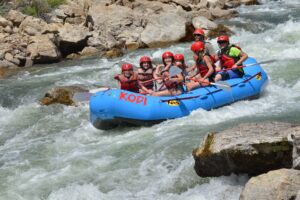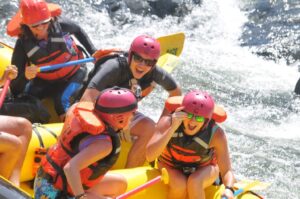Whitewater rafting guides make an average hourly wage of $11.46 to $30.45 per hour, according to payscale’s data. Whitewater rafting guides lead tourists on exciting rafting trips through rough waters and provide them with instructions on how to remain safe.
However, a significant percentage of these rafting guides work as independent contractors, making it a challenging industry to determine average earnings. Factors such as location, experience, and certification can also influence the salary of a whitewater rafting guide. The bureau of labor statistics reports that jobs for recreational workers, such as whitewater rafting guides, are expected to grow by 7% from 2019 to 2029.

Credit: www.nhmagazine.com
The Ins And Outs Of Whitewater Rafting Guides’ Earnings
Whitewater rafting is an exciting activity that involves navigating through rapids and rough waters. As a guide, you get to share that excitement with others and help them have a safe and memorable experience. But, how much do whitewater rafting guides make?
In this blog post, we’ll explore the different types of whitewater rafting guides and what affects their earnings.
Overview Of The Whitewater Rafting Industry And Its Appeal
Whitewater rafting is a fun and thrilling outdoor activity that appeals to many adventure seekers. The industry has grown significantly over the years, with many new companies and destinations popping up all over the world. The industry’s growth has created a demand for whitewater rafting guides, making it a popular career choice for those who love the outdoors and enjoy working with people.
The Different Types Of Whitewater Rafting Guides And Their Earnings Potential
There are different types of whitewater rafting guides, and each has its own earning potential. Here are some of the most common types of guides:
- Apprentice guide: An apprentice guide is a trainee who is still learning the ropes. They earn the lowest pay among guides, usually around $60-$80 per day.
- Guide: A guide is a certified individual who is responsible for leading a rafting trip and ensuring the safety of all participants. They earn an average of $150-$200 per day.
- Head guide: A head guide is a more experienced guide who takes charge of a group of guides on a multi-day trip. They earn an average of $200-$250 per day.
- River manager: A river manager oversees the entire operation, from managing the guides to ensuring the safety of all participants. They earn an average of $300-$400 per day.
The Factors That Influence The Earnings Of Whitewater Rafting Guides
Several factors affect how much a whitewater rafting guide earns. These include:
- Experience: A more experienced guide can earn more than a trainee or less experienced guide.
- Certifications: Guides with more certifications are likely to earn more than those with fewer certifications.
- Location: The location of the rafting company can also affect how much a guide earns. Higher demand locations typically pay more.
- Peak season: During peak season, guides can earn more due to increased demand for rafting trips.
Being a whitewater rafting guide can be a fun and rewarding career choice, and the earning potential can be quite good, depending on your level of experience and certifications. As with any career, it’s important to do your research and find the right fit for you.
The Pros And Cons Of A Career In Whitewater Rafting Guiding
Whitewater rafting is an exciting activity, and many adventure seekers love to experience the thrill of the rapids. However, have you ever thought about turning your passion for rafting into a career? Becoming a whitewater rafting guide can be an excellent career choice for those who love the outdoors and the rush of adrenaline.
In this blog post, we will explore the pros and cons of a career in whitewater rafting guiding, the benefits and drawbacks of being a guide, and how covid-19 has impacted the industry’s earnings.
The Benefits Of Being A Whitewater Rafting Guide
Being a whitewater rafting guide offers numerous advantages. Here are some of the main benefits:
- You get to work in a stunning natural environment. Every day, you work in a beautiful, wild place that most people never get to experience.
- You work in a tight-knit community. Outdoor guiding businesses can be like a family, with many people working together for several seasons.
- You get paid to do what you love. If you love whitewater rafting and leading groups, being a guide can be an excellent way to earn a living.
- You get to meet people from all walks of life. As a guide, you’ll come across many different people who are looking for an adventure and want to experience the thrill of rafting.
The Drawbacks Of A Career In Whitewater Rafting Guiding
Like any job, being a whitewater rafting guide has some downsides. Here are some of the main drawbacks:
- The work can be seasonal. Depending on where you work, your guiding season may only be for a few months each year.
- Physical demands can be challenging. Being a guide requires a lot of physical fitness, and you’ll need to be able to lift and carry heavy equipment.
- The safety of your clients is always paramount. Being a guide, you’re responsible for the safety of your clients, and any mistake or oversight can have dire consequences.
- The pay may not be high. Depending on where you work and the operator, the salary of a guide may not be high.
How Covid-19 Has Impacted The Whitewater Rafting Industry And Earnings
Like all businesses in the travel and tourism industry, the whitewater rafting guiding industry has been significantly impacted by the covid-19 pandemic. Here are some of the changes and challenges that operators have had to face:
- Business operations have been affected. Many companies have had to temporarily close or reduce their capacity due to social distancing and public health restrictions.
- The safety guidelines have been updated. Whitewater rafting guiding companies are following new safety protocols which can be costly and time-consuming to implement.
- Reduced demand for travel has affected the industry’s earnings. With fewer people traveling and a lack of international tourists, many guiding operators face a difficult financial year.
- Higher costs due to covid-19 precautions. Guides need to be trained with the pandemic in mind, and companies may have to invest in personal protective equipment, sanitation supplies, and medical-grade gear.
Being a whitewater rafting guide has its advantages and drawbacks. If you are passionate about adventure, love nature, and people, being a whitewater rafting guide might be an excellent career choice for you. However, be aware of the physical and mental demands of the job and the seasonality of the business.
The covid-19 pandemic has brought new challenges to the industry, so operators must adapt and implement new protocols to keep themselves and their clients safe.
Frequently Asked Questions For How Much Do Whitewater Rafting Guides Make
How Much Do Whitewater Rafting Guides Make Annually?
The average annual salary for a whitewater rafting guide ranges from $25,000 to $50,000.
What Is The Difference Between A Part-Time And Full-Time Guide?
Full-time guides are usually seasonal employees who work for a company throughout the entire rafting season, while part-time guides typically work only a few days a week.
What Qualifications Are Necessary To Become A Rafting Guide?
Qualifications vary by state and company but are typically a minimum age of 18, first aid and cpr certification, and completion of a guide training program.
Conclusion
Whitewater rafting has become an increasingly popular adventure sport, not only in the us but worldwide. From the information we have gathered, it’s clear that being a whitewater rafting guide is more than just a hobby for adrenaline junkies. Rafting guides are skilled professionals who must possess vast knowledge of the sport and the location, have excellent communication and leadership skills, and prioritize safety and customer satisfaction.
The pay range is relatively good, but it’s largely dependent on factors like experience, location, employer, and the type of guest-seeking adventure. Despite some challenges and risks in the industry, many experienced whitewater rafting guides find the job rewarding and enjoyable.
If you have a passion for the outdoors and love sharing experiences with people, a career as a whitewater rafting guide might be a worthwhile pursuit.



